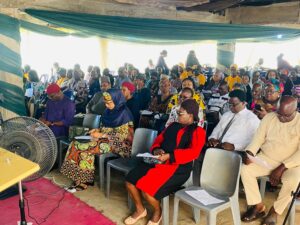By: Goodluck E. Adubazi, Abuja.
Nigeria’s ginger is an ocean of wealth, discovered in 1823. Nigerian ginger is recognized as the highest quality in the world and the country is ranked as the third-largest producer globally.
Ginger stands out as a strategic crop with high global demand due to its medicinal and industrial uses. However, the food value of this important commodity remains largely untapped in Nigeria.
With an estimated annual production of 160,000 metric tons, Nigeria holds the third position globally in ginger production. Kaduna, the highest producer in the country, contributes 60% of national output, followed by Nasarawa and Gombe states. However, the Federal Capital Territory (FCT), Abuja, particularly the fertile zones of Bwari, Kuje, Abaji, and Kuwari — has the potential to become a center of excellence for ginger processing and commercialization.

This investors’ forum provides a timely platform to engage critical stakeholders in identifying investment opportunities and designing practical strategies to boost ginger-based industrial activities within the FCT.
To enrich the experience and deepen the economic potential of this forum, there will also be exhibitions showcasing future innovations in ginger products.
These exhibitions will highlight creativity, entrepreneurship, and the diverse industrial applications of ginger from oil extracts, tea blends, and soaps to spices, pharmaceuticals, and cosmetics.
“We believe this visual and interactive display will inspire greater confidence and reveal the untapped possibilities within the ginger value chain, encouraging prospective investors to explore bankable ventures,” said Olatujubosun Olajubu, representative of the Federal Capital Territory Coordinating Office of the Raw Materials Research and Development Council (RMRDC), in his welcome address on day one of the two-day Investors Forum on Industrial Utilization of the Ginger Value Chain and Its Economic Potentials in the FCT. The event was organized by RMRDC FCT Office with the theme: Industrializing the Ginger Value Chain: Harnessing Innovations, Investment, and Market Opportunities for Sustainable Economic Growth in the FCT.
In his opening remarks, the Director,General of RMRDC, Prof. Nnanyelugo M. Ike-Muonso, welcomed participants, stating: “It is with great pleasure that I welcome you all to this investors’ forum convened to explore one of Nigeria’s most promising crops, ginger, and the vast industrial opportunities embedded within its value chain. Today’s gathering is not just another conference, but a call to action.”
He further stated: “Nigeria is blessed with an abundance of ginger, yet much of its economic value remains untapped. Despite being the third-largest producer globally, our local industry continues to underutilize this resource, exporting it largely in raw form while importing processed ginger products worth trillions.”
According to the DG, the forum seeks to change that narrative. Through collaboration between RMRDC, the FCT Department of Science, Technology and Innovation, the National Ginger Association of Nigeria, and other stakeholders, a platform is being created for investors, entrepreneurs, researchers, policymakers, and farmers to connect and collaborate.
Together, Prof. Nnanyelugo said, they aim to drive industrial investment, develop processing infrastructure, and promote value-added production of ginger-based products that meet both local and international standards.
“Value addition is key to industrial growth, economic diversification, and sustainable job creation,” said Dr. (Mrs.) Edith C. Obi, RMRDC Overseas Director, who represented the DG.
The ginger value chain offers opportunities for manufacturing extracts, oils, beverages, health supplements, and more. “Our objective is to ensure that every segment of this chain becomes productive, profitable, and globally competitive,” the DG emphasized.
As Nigeria’s premier institution for raw materials development, RMRDC has, over the past decades, championed the drive for local sourcing of industrial raw materials and the promotion of value-added manufacturing, he added.
“The RMRDC stands ready to support investors with technical guidance, reliable data, market intelligence, research outcomes, and strategic partnerships that will help bring your ideas to reality,” Prof. Nnanyelugo assured.
RMRDC reiterated its resolve to stop the exportation of Nigerian raw materials in their unprocessed form and pledged to promote at least 30% value addition to local resources.
Fielding questions from journalists, the President of the National Ginger Association of Nigeria described the event as a milestone — a turning point in the history of the ginger industry in Nigeria. He stated that this gathering, supported by President Bola Ahmed Tinubu’s administration under the Renewed Hope Agenda, represents a long-awaited moment for unified stakeholder action.
Speaking on the health benefits of ginger, National President Nuhu B. Daudu reflected on the 18th century, noting that most women did not suffer from breast cancer due to the regular intake of ginger in their meals, including soups and curries. According to Squadron Leader (Rtd.) Nuhu B. Daudu, ginger can eliminate harmful free radicals in the body that may lead to pre-cancerous or cancerous cells. He referenced medical journals from the U.S. to support ginger’s curative potential.
Also speaking at the event, Dr. (Mrs.) Adedeyin Asa, Head of Station, National Root Crops Research Institute, Kaduna Sub-Station, emphasized the global market potential for dried powdered ginger. She encouraged Nigerian youth to venture into ginger farming, assuring them of high returns and minimal supervision required for cultivation.
“With 13 years of experience in ginger research and farming, I can confidently say that anyone who invests in ginger farming will not regret it. It’s a low-maintenance crop that yields high returns,” she said.
Standard Times Nigeria Newspaper, which covered the event, reported the presence of dignitaries, including the Emir of Zazzau and the Sarkin Jiwa, HRH Dr. Idris Musa, MFR, among others.
The event, which commenced on July 8, concluded on July 9 with a communiqué issued by stakeholders at the conference.